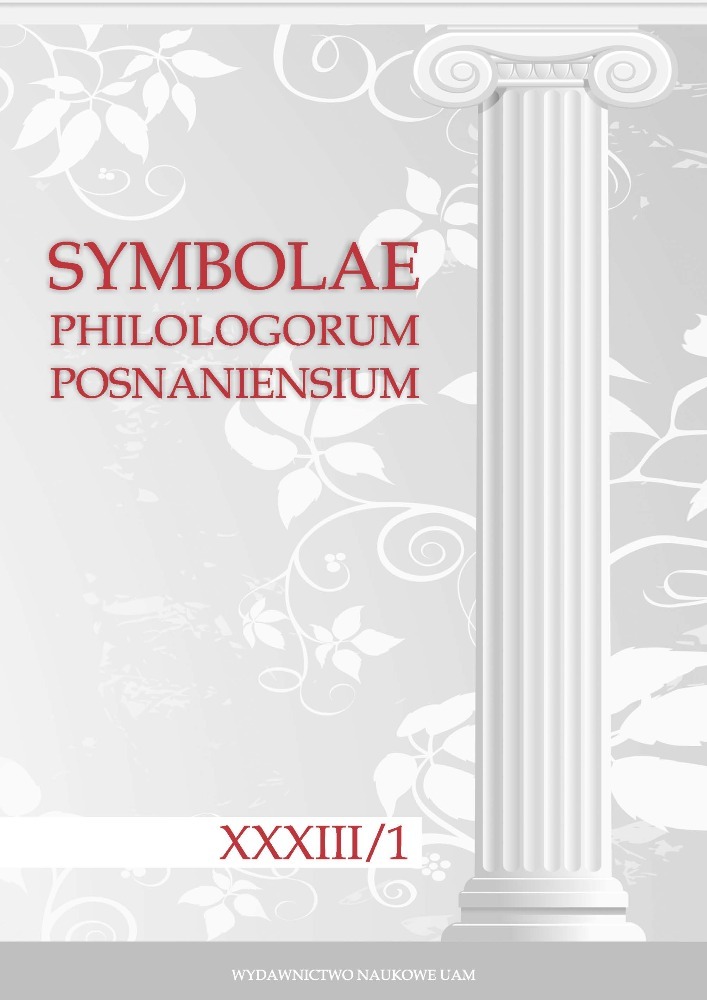Abstrakt
The purpose of the article is to analyse the four Polish translations of Testamentum porcelli: by Witold Truszkowski (1972), Magdalena Nowak (1996), Maciej Jońca (2011) and the team comprising Andrzej Dzikowski, Aldona Jurewicz and Gabriela Molisak (2016). Every translator has their own strategy for rendering the text in Polish but none of them includes all the aspects of the ancient parody: linguistic peculiarities (colloquialisms, neologisms), stylistic figures, technical terminology (zootechnical and legal), the differences in style and humorous tone of the of the text. The translation strategies applied by the translators vary depending on the research field which lies within the scope of interest of each translator. Truszkowski concentrates on proper rendering of the stylistic features of the text, and is especially interested in the colloquial character of the ancient parody. Nowak attempts to focus on the sources of humour, but her translation is nearly literal. Jońca draws attention to technical legal terms, as does the team Dzikowski, Jurewicz and Molisak, although these translators also emphasise zootechnical lexemes. Each of these translation strategies shows a different layer of Testamentum porcelli.
Bibliografia
Ostatnia wola prosiaka (Testamentum Porcelli), przeł. W. Truszkowski, „Literatura na Świecie” 4 (1972), 131–132.
O tym, jak prosiak napisał testament, przeł. M. Nowak, „Filomata” 439–440 (1996), 416–421.
Plaut, Komedie, t. I–IV, przeł. E. Skwara, Warszawa 2002–2017.
T. Maccius Plautus, Komedje, t. I–IV, przeł. G. Przychocki Kraków 1931–1937.
Święty Hieronim krytykuje Testamentum porcelli, przeł. M. Jońca, w: ‘Apud patres’. Prawo rzymskie w literaturze wczesnochrześcijańskiej, red. A. Dębiński, M. Wójcik, Lublin 2011, 29–51.
Testamentum porcelli, przeł. A. Dzikowski, A.R. Jurewicz, G. Molisak, „Zeszyty Prawnicze” 16 (2016), z. 4, 11–35. DOI: https://doi.org/10.21697/zp.2016.16.4.02
Adams 1990: J.N. Adams, The Latin Sexual Vocabulary, Baltimore 1990.
Andrés 2003: G.H. Andrés, El estatuto lingüístico del Testamentum Porcelli, w: LÓGOS Hellenikós: homenaje al Profesor Gaspar Morocho, ed. J.M Nieto Ibáñez, León 2003, 159–167.
Aubert 2006: J.-J. Aubert, ‘Du lard ou du cochon’? The ‘Testamentum porcelli’ as a Jewish Anti-Christian Pamphlet, „A Tall Order. Writing the Social History of the Ancient World” 216 (2005), 107–141. DOI: https://doi.org/10.1515/9783110931419.107
Baldi 2002: P. Baldi, The Foundations of Latin, Berlin 2002. DOI: https://doi.org/10.1515/9783110892604
Baldwin 1984: B. Baldwin, The Testamentum Porcelli, w: Studies on Late Roman and Byzantine History, Literature, and Language, Amsterdam 1984, 137–148.
Bednarski 1981: M. Bednarski, Łacina potoczna, Wrocław 1981.
Bott 1972: N.A. Bott, ‘Testamentum Porcelli’. Text, Übersetzung und Kommentar, Zürich 1972.
Chiarugi 1978: E. Chiarugi, „Solivertiator”, „Atene e Roma” 23 (1978), z. 2–3, 87–93.
Černoch 2016: R. Černoch, Testamentum porcelli – analýza, diss. Brno 2016.
D’Ors 1953: A. D’Ors, Testamentum Porcelli: Introduccion, Texto, Traduccion y Notas, „Suplementos de Estudios clásicos. Serie de textos” 3 (1953), 74–83.
Dianotti 2015: P. Dianotti, Word Order and Expressiveness in the Aeneid, transl. A. Campbell, Berlin 2015. DOI: https://doi.org/10.1515/9783110401028
García Sánchez 2013: J.J. García Sánchez, El testamentum porcelli una fuente de latín vulgar siempre sugerente, w: Romanística. UM, eds. J. Corrêa-Cardoso, M.C. Fialho, Coimbra 2013, 53–70.
Greń, Krasowska 2008: Z. Greń, H. Krasowska, Słownik górali polskich na Bukowinie, Warszawa 2008.
Haupt 1876: M. Haupt, Index lectionum aestivarum 1860, w: Mauricii Hauptii Opuscula, vol. II, Leipzig 1876, 175–183.
Herrmann 1956: L. Herrmann, Le Testament du cochon, w: Studi in onore di Ugo Enrico Paoli, ed. L. Banti, Firenze 1956, 385–391.
Hofmann 1926: J.B. Hofmann, Lateinische Umgangsprache, Heidelberg 1926.
Karakasis 2005: E. Karakasis, Terence and the Language of Roman Comedy, Cambridge 2005. DOI: https://doi.org/10.1017/CBO9780511482267
Loch 2019: M. Loch, PEDICARE. Studium lingwistyczno-kulturowe z zakresu seksualności starożytnych Rzymian, Poznań 2019 (nieopublikowana rozprawa doktorska).
Löfstedt 1997: B. Löfstedt, Probleme im Testamentum porcelli, „Aevum” 71 (1997), z. 1, 151–152.
Mantzilas 2020: D. Mantzilas, Η ΑΝΩΝΥΜΗ ΣΑΤΙΡΑ TESTAMENTUM PORCELLI: ΝΟΟΥΜΕΝΑ ΚΑΙ ΥΠΟΝΟΟΥΜΕΝΑ, w: ΔΟΣΙΣ ΑΜΦΙΛΑΦΗΣ. Honorary volume for Professor Emerita Katerina Synodinou, ed. Η. Gasti, Ioannina 2020, 63–392.
Masterson 2014: M. Masterson, Studies of Ancient Masculinity, w: A Companion to Greek and Roman Sexualities, ed. T.K. Hubbard, Malden 2014, 17–30. DOI: https://doi.org/10.1002/9781118610657.ch2
Migdał, Migdał 2008: W. Migdał, Ł. Migdał, Słownictwo gwarowe w hodowli zwierząt, „Wiadomości Zootechniczne” XLVI (2008), z. 3, 53–62.
OLD: The Oxford Latin Dictionary, eds. P.G.W. Glare, Oxford 1996.
Poccetti 2003: P. Poccetti, Le Testamentum Porcelli, entre philologie et pastiche macaronique, „Revue Des Études Latines” 81 (2003), 252–276.
Poccetti 2004: P. Poccetti, La variazione di registro come ragione di produzione e di circolazione di un testo: Il Testamentum porcelli, w: Registros lingüísticos en las lenguas clásicas, eds. A. López Eire, A. Ramos Guerreira, Salamanca 2004, 235–268.
Rademacher 1918: L. Rademacher, Beiträge zur Volkskunde aus dem Gebiete der Antike, Wien 1918.
Ramos Maldonado 2005: S.I. Ramos Maldonado, Terminología erótica y efecto cómico en el ‘Testamentum Porcelli, „Habis” 36 (2005), 407–421.
Shinomori 2016: D. Shinomori, ‚Testamentum Porcelli‘. Ein von Sklaven errichtetes Testament?, w: Aus der Werkstatt römischer Juristen. Vorträge der Europäisch-Ostasiatischen Tagung 2013 in Fukoka, Berlin 2016, 354–375.
Truszkowski 1957: W. Truszkowski, Teksty łaciny potocznej, Warszawa 1957.
Williams 2010: C. Williams, Roman Homosexuality, Oxford 2010.
Wypustek 2020: A. Wypustek, Rzymskie graffiti seksualne, erotyczne i miłosne z Pompejów i Herkulanum (I wiek n.e.), Warszawa 2020.


